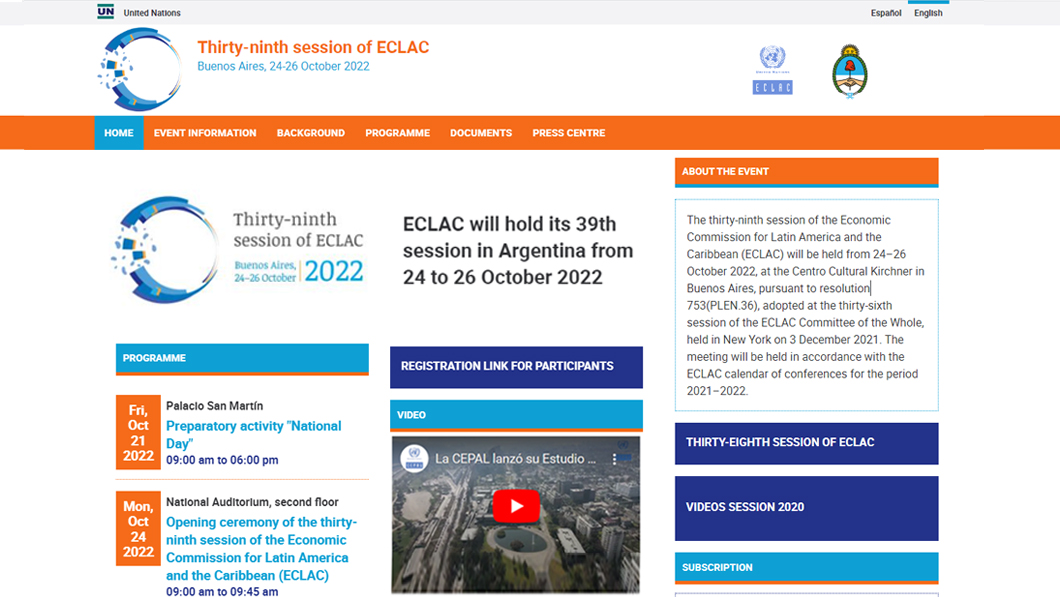Thirty-ninth session of ECLAC
The thirty-ninth session of the Economic Commission for Latin America and the Caribbean (ECLAC) will be held from 24 to 26 October 2022, at the Centro Cultural Kirchner in Buenos Aires.

Link to the website of the thirty-ninth session of ECLAC
The session is the most important event of each biennium for ECLAC. It provides a forum for the consideration of issues of importance for the development of the countries of the region and an opportunity to review the progress of the Commission’s activities. In consultation with the Chair, the theme selected for this session is production, sustainability and inclusion, which is addressed in a document that ECLAC will make available to its member States.
The session also enables the governments of member States to examine the secretariat’s report on the Commission’s activities and thus apprise themselves of the work accomplished by ECLAC during the preceding year. Furthermore, through the programme of work that the governments adopt and the calendar of conferences they approve, they also define the mandates that will guide the Commission’s work in the future.
The President of Argentina, Alberto Fernández, the Minister of Foreign Affairs and Worship of Costa Rica, Arnoldo André Tinoco, in his capacity as Chair of the thirty-eighth session, the Executive Secretary of ECLAC, José Manuel Salazar-Xirinachs, and the United Nations Secretary-General (with a pre-recorded video message) will open the session in the morning of Monday, 24 October.
The Executive Secretary of ECLAC will then present the main document, on which a group of experts and other authorities have been invited to offer comments. The secretariat has organized a high-level seminar in which ministers, representatives of member countries, academics and leading experts will discuss in detail the central theme of the thirty-ninth session. The seminar, which includes four panels, will take place during the afternoon of 24 October and the morning of 25 October.
The chairs of the subsidiary bodies of ECLAC and other intergovernmental meetings have been invited to make brief statements during the afternoon of 25 October to report on the activities carried out since the previous session.
The subsidiary bodies of ECLAC are standing intergovernmental bodies that examine various public policy issues in the region, facilitate cooperation and peer-to-peer learning based on comparative experiences, adopt regional consensuses in their respective areas of competence and generate mandates for the Commission.
The secretariat will submit a report to the delegations summarizing the activities carried out and the outcomes achieved by the ECLAC system, which includes the Latin American and Caribbean Institute for Economic and Social Planning (ILPES), under its programme of work for 2021, as well as the draft programme of work of the ECLAC system for 2024. The overall purpose of the programme is to promote the economic, social and environmentally sustainable development of Latin America and the Caribbean through international cooperation, by performing analytical, normative and advocacy work, undertaking applied research and evidence-based comparative analysis of development processes, and providing technical cooperation, and advisory and capacity-building services in support of regional development efforts.
In the morning of Wednesday, 26 October, ECLAC and the Government of Argentina have organized a dialogue with ministers of foreign affairs of the region and other high-level authorities, to reflect upon the economic, social and sustainability situation of the Latin American and Caribbean countries and the external shocks that have eroded the investment and production conditions in the region in a context of persistent uncertainty, worsened by the COVID-19 pandemic and the war in Ukraine.
It is worthy of note that this will be the first opportunity of the Executive Secretary of ECLAC, José Manuel Salazar-Xirinachs, to share with the ministers of foreign affairs his views on the challenges of the region and the role of ECLAC in this regard.
Finally, member States will adopt the resolutions of the thirty-ninth session.